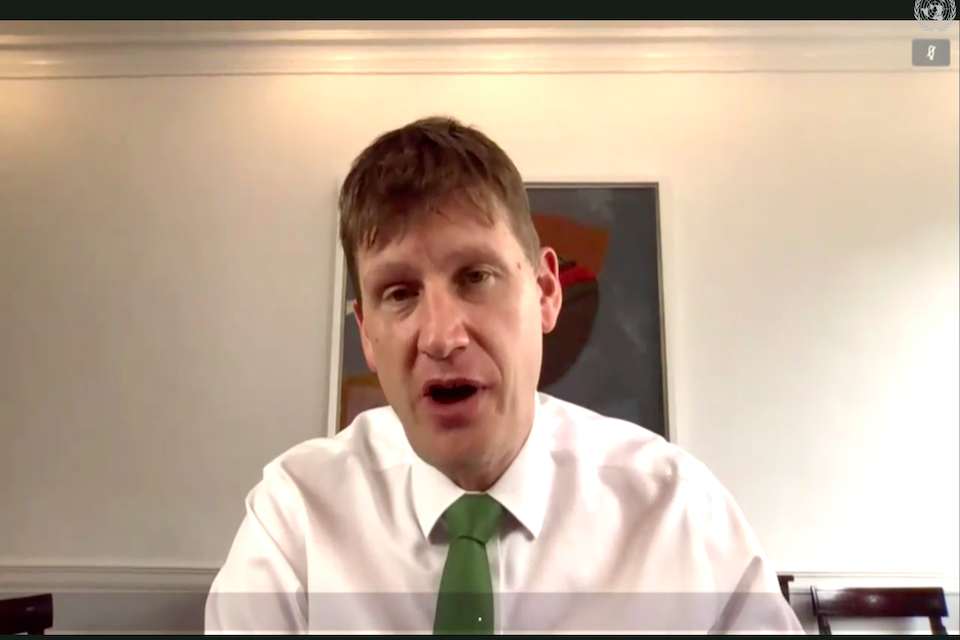Progress is still needed if a political settlement is to be reached in Syria
Statement by Ambassador Jonathan Allen, UK Chargé d'Affaires to the UN, at the Security Council briefing on Syria

Thank you very much, Mr. President. And may I thank the Special Envoy for being here today and for his comprehensive briefing, as always.
Mr. President, we remain concerned about the security situation in Syria. Now whilst we’re not seeing the levels of violence in the north-west that we saw at the beginning of this year, we know recent clashes between armed groups and regime forces south of the M4, as well as ongoing regime shelling into the Idlib de-escalation zone. The cease fire in Idlib, as well as that in the north-east, must be upheld in practice and not in name only. And we also fully condemn continued attacks by extremist forces, including by Daesh.
We remain concerned about a rise in violence in the south of the country and the risk that this violence causes reconciliation agreements there to fall apart. And we’d be grateful for an update, including from our Russian colleagues, on implementation of those reconciliation agreements reached in summer 2018. It remains vital colleagues that localised ceasefires lead to a nationwide ceasefire, as called for by the United Nations Special Envoy and the Secretary-General. This is necessary not only to bring an end to this devastating conflict in accordance Resolution 2054, but to enable full attention to be devoted in the fight against COVID-19.
Now on that, we’re continuing to support efforts led by the World Health Organization to confront the real risk posed by COVID-19. to all parts of Syria. We recognise the efforts made by authorities across the country, and we urge practical cooperation between them all to confront a disease which knows no boundaries.
There remains an urgent need for medical supplies and other necessary humanitarian aid to reach recipients in need without hindrance. And we should not be dogmatic about the modalities of doing so, including by renewing cross-border assistance to all areas which need it. And we’ll have an opportunity to discuss this, of course, further tomorrow.
Let me just say a note on sanctions, in support of what some others have said, goods and medical supplies used for humanitarian purposes are not subject either to EU sanctions or to UK national sanctions. And additional exemptions from sanctions are available for humanitarian activity in Syria. I’d just like to note that the United Kingdom and our US and European partners are the leading donors for humanitarian aid in Syria, including in regime held areas. The problems facing the Syrian health sector and the economy are a result not of sanctions, but of the Syrian regime’s actions through its cronyism, corruption and its brutal conduct of the war which includes, I am afraid, politically motivated punitive restrictions on humanitarian aid. If the Syrian regime and its allies want to see removal of sanctions, then they know what they have to do. Engage seriously with the Special Envoy and the UN led political process to achieve a peaceful end to the Syrian conflict.
Now, regarding the political process, we are disappointed that notwithstanding the urgent humanitarian needs, the deteriorating economy and the continued threat of COVID-19. 19, there still appears to be no urgency in working with the UN Envoy to achieve political progress towards a political settlement. Like others, we welcomed the formation of the Constitutional Committee last year. But it’s been over a month since the agenda for the Constitutional Committee was agreed and nearly six months since its last meeting. We cannot let hard won progress on this front be lost because of lethargy and disinterest from Damascus. I call on Russia to bring its influence to bear on its Syrian clients.
In order to maintain momentum and keep the progress alive. We encourage at least the co-chairs of the Committee to convene urgently by video conference to discuss issues including how a full meeting can work in practice.
And we also urge the regime to make widespread releases of political prisoners and vulnerable people and ensure medical care is available for those still in detention. While we welcome negotiated releases, we would note that One for One releases are insufficient in a context where the regime holds far more detainees than opposition forces. And I’d like to emphasise once again and for the record, that there cannot be any reconstruction funding from the United Kingdom without the regime’s genuine engagement with a credible and sustainable political process.
Let me conclude colleagues, by reiterating what I believe we all have said that the deliberate targeting of humanitarian infrastructure and civilians is never acceptable. Whether through ground attacks, barrel bombs, air strikes or chemical weapons. We note Amnesty International’s recent report detailing 18 attacks on medical facilities and schools between May 2019 and February 2020, which only adds to the evidence provided by the Board of Inquiry and Commission of Inquiry. As with the chemical weapons attacks carried out by the Syrian regime and detailed in the OPCW IIT report.
Those responsible must and will be held to account. In the meantime, such disregard for international humanitarian law must cease.
Thank you, Mr. President.